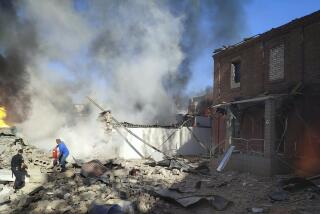Global Accord Sought on Nuclear Disaster Disclosure
- Share via
VIENNA — Pressure has begun to build for an international agreement that would force governments to share information in the event of a nuclear power plant disaster, officials at the International Atomic Energy Agency said Friday.
While there are several such binding agreements between individual nations that require a country to give immediate, extensive detail on a nuclear accident, the internationally accepted guidelines set out by the IAEA are legally unenforceable.
With 112 member countries, including all nations operating nuclear power plants, the IAEA is the premier international agency in its field.
However, it enjoys the power of international law only in its careful monitoring of nuclear fuel movements. Here it functions as an internationally accepted watchdog, making certain that no country tries to divert fuel for military purposes.
No Soviet Details
As of late Friday, the Soviets had failed to notify the IAEA of details of the accident at the Chernobyl nuclear power plant as specified under the guidelines that the Kremlin itself helped to draft.
According to agency officials, three brief telex messages that it has so far received from Moscow have fallen far short of these guidelines, which include notification of radiation levels at the accident site, progress reports on the disaster and details about how it occurred.
One official said that the agency has offered to send radiation protection teams and other experts to evaluate the disaster but has so far received no reply.
There has also been no Soviet response to an IAEA suggestion that the agency operate as an information relay point, passing on details to affected nations, the official said.
Worrisome Aspect
The absence of such information has been one of the most frustrating, worrisome aspects of the disaster, especially for nations like Finland, Sweden, Poland and Austria that have measured abnormally high radiation levels as a result of the disaster.
Sweden’s Energy Minister Birgitta Dahl and her British counterpart, Peter Walker, have both demanded additional detail from the Soviets, while West German Science and Technology Minister Heinz Riesenhuber has called for more extensive cross-border agreements on nuclear matters.
Many of the countries most severely affected by the disaster are members of the IAEA’s board of governors, and there are indications that tough new measures dealing with information exchange could be discussed as early as next week.
More to Read
Sign up for Essential California
The most important California stories and recommendations in your inbox every morning.
You may occasionally receive promotional content from the Los Angeles Times.










